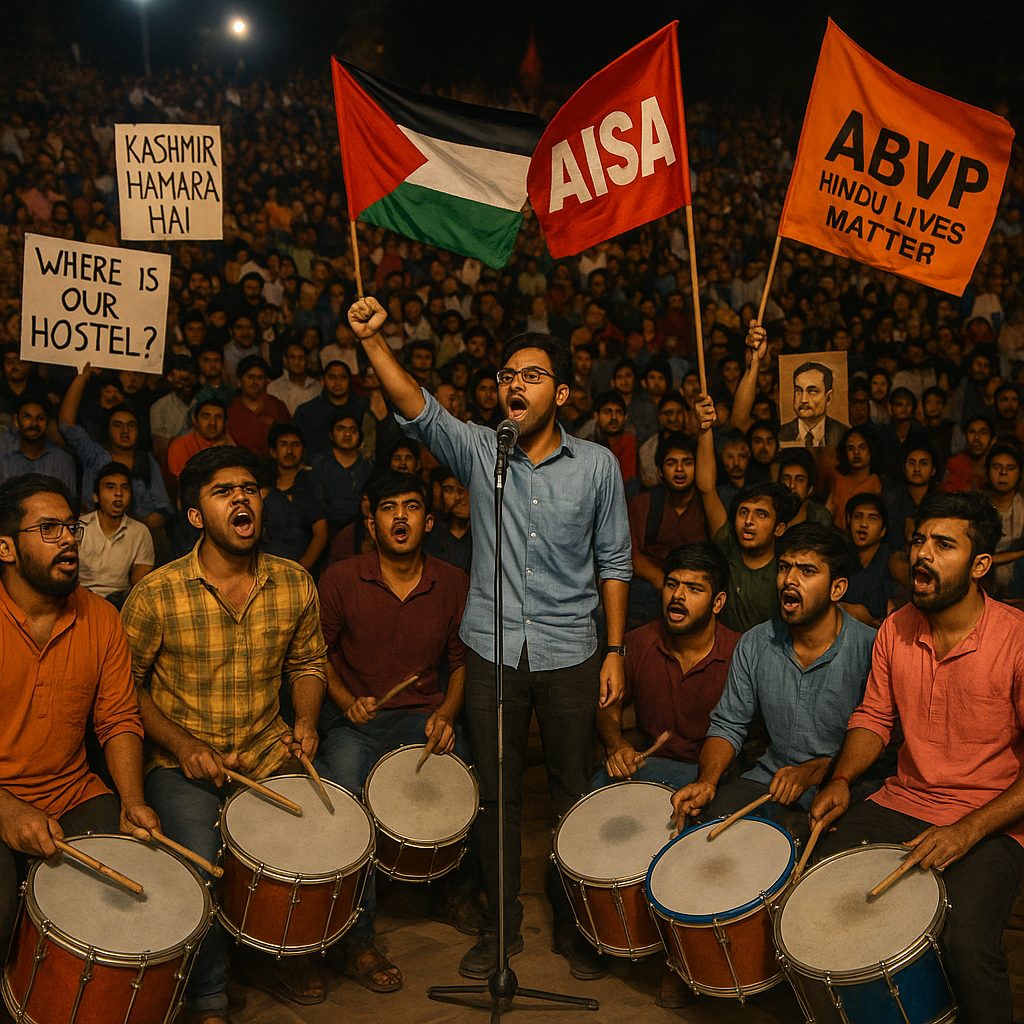Slogans, songs and solidarity: Explosive presidential debate sets JNU abuzz ahead of polls
From cries of “Kashmir hamara hai” and “Hindu lives matter” by the Akhil Bharatiya Vidyarthi Parishad (ABVP) to chants of “Azadi” and the sight of a Palestinian flag by the All India Students Association (AISA) in solidarity, the amphitheatre turned into a mini-parliament of India’s most politically conscious campus.
Every inch of the venue told a story. Handwritten posters demanded answers, “Where is our hostel?” asked one. Some bore portraits of Jawaharlal Nehru, faded but firm, peeking from the crowd as reminders of the university’s roots.
The Election Committee frequently had to intervene as the deafening clash of dhaplis, drums, and chants drowned out the microphones.
The debate began at 11:30 pm on Wednesday and stretched into the early hours of Thursday, concluding around 4 am. All 13 candidates were allotted 10 minutes each to present their views, turning the campus amphitheatre into a charged arena of ideological face-offs and political expression.
Before the speeches commenced, a two-minute silence was observed in memory of the 26 people killed in the recent terrorist attack in Pahalgam, Jammu and Kashmir — a sombre moment that briefly cut through the intense atmosphere of the night.
ABVP’s presidential candidate Shikha Swaraj electrified the crowd with fire of her own, invoking the recent Pahalgam terror attack. “To those who say terrorism has no religion, were the victims not asked their faith before being killed?” she asked. “The Left has failed JNU. It’s time ABVP showed how to truly fight for student rights.” “Andhera hai, raat hai, ye laal andhera chhatega aur is JNU campus mein Akhil Bhaarateey Vidyaarthee Parishad ka sooraj ugega,” Swaraj added.
AISA’s Nitish Kumar issued a sharp rebuttal of alleged election manipulation.
“This is no mayoral election in Chandigarh to be rigged. This is JNU!” he declared, before launching into a rendition of Faiz Ahmed Faiz’s iconic poem: “Chali hai rasm ki koi na sar uthake chale. Jo koi chaahne waala tawaf ko nikle najar chura ke chale jism-o-jaan bache ke chale.” National Students’ Union of India’s (NSUI) Pradeep Dhaka wove a narrative that jumped from Gautam Adani to Donald Trump, from Punjab’s farmers to the constitution. “The Constitution will run this country, not any organisation,” he thundered.
All India Democratic Students’ Organisation’s (AIDSO) Suman painted a grim picture of the university’s academic resources. “No journals in the library. No funds. We’re forced to take loans from HEFA (Higher Education Financing Agency). We need to do politics like Bhagat Singh and Subhash.” Independent candidates, often drowned in the noise, quietly made their presence felt, blaming both Left and Right for neglecting students’ real concerns in favour of larger ideological battles.
This year’s elections have seen major realignments. The long-standing United Left has splintered. AISA has allied with the Democratic Students’ Federation (DSF), while the Students’ Federation of India (SFI), Birsa Ambedkar Phule Students’ Association (BAPSA), AISF, and PSA have forged another bloc.
The ABVP has fielded a full panel: Shikha Swaraj (President), Nittu Goutham (Vice-President), Kunal Rai (General Secretary), and Vaibhav Meena (Joint Secretary). From the AISA-DSF alliance: Nitish Kumar (President), Manisha (Vice-President), Munteha Fatima (General Secretary), and Naresh Kumar (Joint Secretary).
With 7,906 students eligible to vote, 57 per cent male and 43 per cent female, the battle is fierce and deeply personal.
Polling will be held on April 25 in two sessions: 9 am to 1 pm, and 2:30 pm to 5:30 pm. Counting will begin the same night, and results are expected by April 28.
Whether it’s the fight for hostels or the call for Palestine, JNU’s election debate proved again that on this campus, the personal is always political and the political, always poetic. PTI MHS GRS GRS



